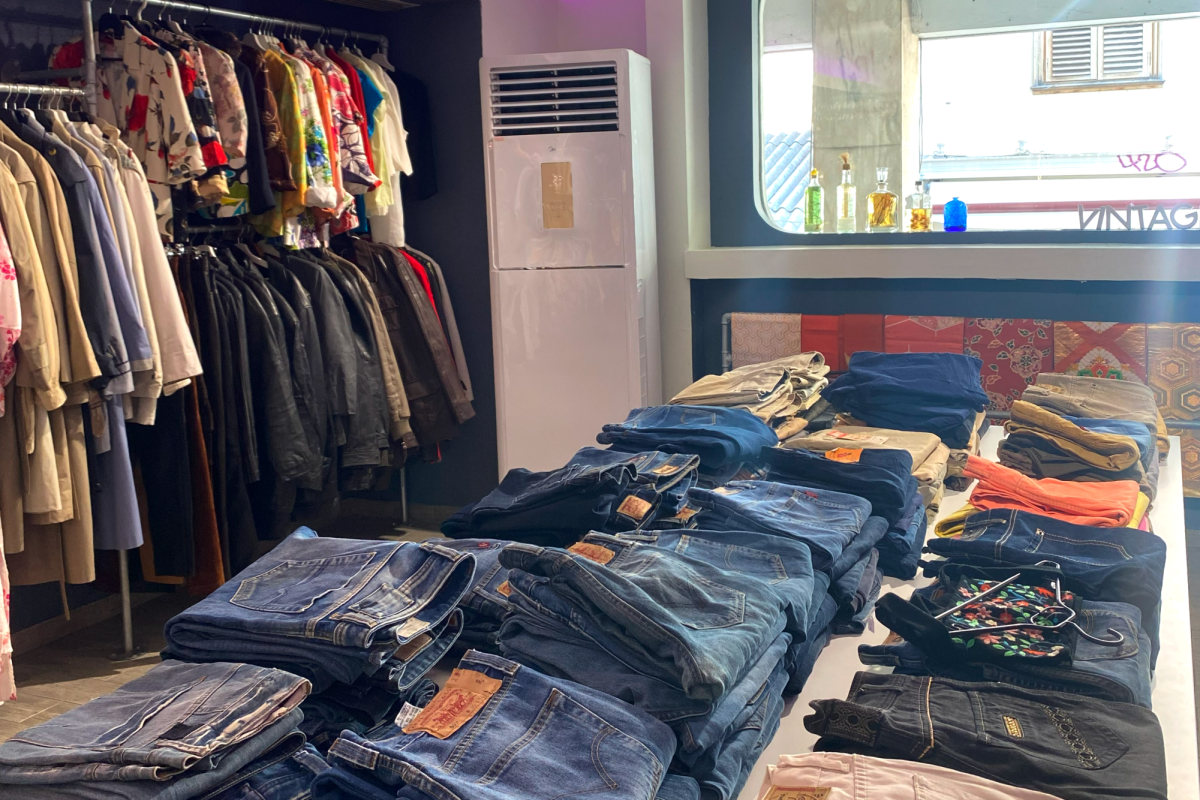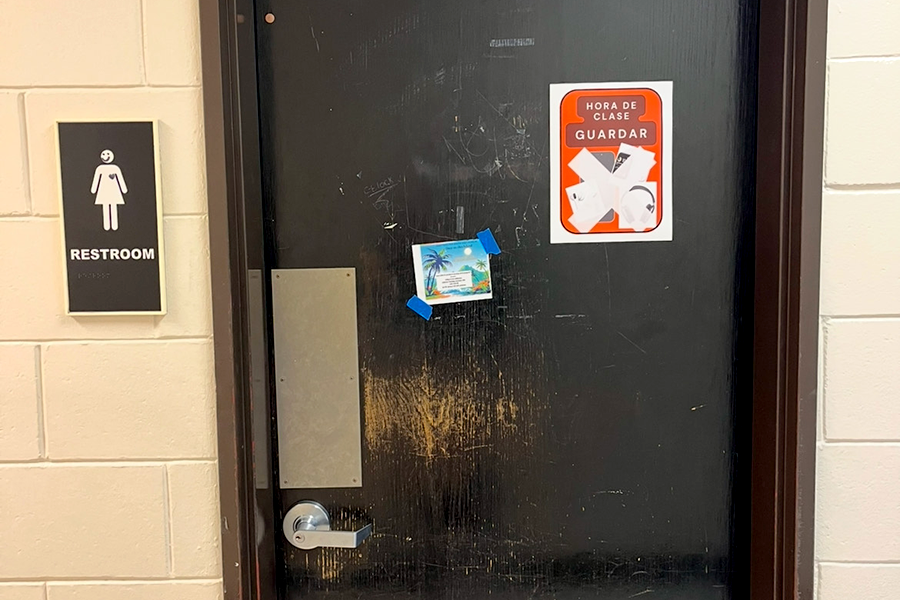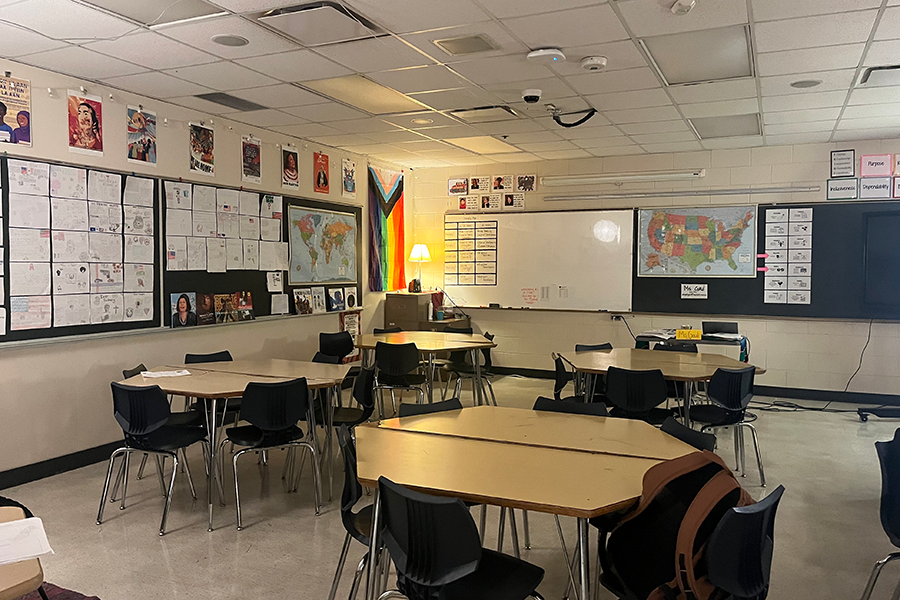It seems that there are record numbers of pages on the Internet dedicated to the idea of hurling insults at others. “South High Clowns,” a page started on Twitter, is a recent example from the beginning of the school year. Washburn High School and Southwest High School have experienced similar situations with the Twitter page “Washburn Troll” and a “Burn Book” on Facebook.
But an anonymous online personality has recently acted upon a novel idea in the midst of these sites – a site that uses the internet to be kind.
This Facebook page is called “Southhighschool Compliments” and is facilitated by a mystery do-gooder in the South High community. The page is set up as a personal site, as opposed to a group. Although you must “friend” the page in order to see posts, the facilitator will not deny a friend request.
The description on the page says that anyone can send a message through Facebook to the facilitator. This mystery personality has committed to anonymously post any thought, regardless of the sender or the recipient. The only rule is that it must be a compliment.
The facilitator of the page wished to remain anonymous, but gave an interview through email. He/she said that people started sending messages with compliments about eight hours after the page was created and friends had been added.
“The speed took me by surprise,” said the facilitator, “but it made me feel really, really good about South students.”
The facilitator had seen compliment pages on Facebook and Twitter, and finally decided to create the page to “do a big, kind thing for the New Year.”
“This page was created to spread random acts of kindness to students at South,” reads the page description.
This was a central theme in the recent “Rachel’s Challenge” assemblies that took place at South. These assemblies, which were held in honor of the first victim at the Columbine High School shooting of 1999 in Colorado, encouraged students to start a “chain reaction” of kindness by being kind to others.
The “Southhighschool Compliments” facilitator agreed, explaining that one little thing can change a person’s day or even life.
“I’ve had people respond to their compliments saying, ‘My day was really crappy, but it got 10 times better when I read this!’ which is proof that one little thing can affect someone’s day, and create a chain reaction for the next person to want to do good.”
In response to the presentation, a new group at South has been formed. It is called the Friends of Rachel club and is dedicated to promote Rachel’s Challenge. In an after school student training, presenter Jonathan Oliver suggested a social networking compliment project to the group. The project would consist of a team of students “patrolling” Facebook for any instances of cyberbullying, and combatting those comments by complimenting the recipient. Although Southhighschool Compliments was not created in direct response to an act of cyberbullying, the ideas behind each of these projects are very similar.
Oliver is very supportive of the idea. “I think [the page is] great because it takes the negative feel out of social media and it puts a positive impact on it instead,” Oliver said. “It just helps you keep your mindset in a [positive] attitude.”
But despite the progress that this page and Rachel’s Challenge are making, Oliver thinks that cyberbullying has “gotten worse.”
“As technology increases more,” he explained, “and people get more connected to their phones versus connected to each other… that disconnect happens between how we speak and treat one another.”
Junior Emily Harman was cyberbullied on Formspring, which was a popular site a couple years ago. The site allowed anyone online to send anonymous questions to those with Formspring accounts, and in Harman’s case, it got extreme. “It’s not what I needed to hear,” Harman said. “It was a little blow to your self-esteem.”
Oliver and junior Lucie Bradt agree that the anonymous factor plays a huge role in the prevalence of cyberbullying.
“If nobody knows it’s you, it’s way easier to say something mean about someone,” Bradt said, “because there’s no way of them finding out who it is.”
Oliver added that cyberbullying is a cowardly form of bullying, because the bully is able to hide behind their computer screen.
“I dare someone to say what they would say over a computer to someone’s face,” he exclaimed.
Although a lot of people seem to appreciate positive sites like this one, they don’t last long. Earlier in the school year, a Twitter group called “South Compliments” was started in reaction to the insult-driven group, “South High Clowns.” The positive page lasted only 6 days. “South High Clowns,” however, was constantly being checked and refreshed by South students, and was only taken down after being reported to Twitter. Another Twitter page called “South Sweetness” was posted for only one day.
It seems that, as a general rule, pages based on insults last considerably longer than those based on compliments. But why is this the case?
Junior Cole Nelson thinks that this is just because negativity is, “kind of that wicked humor that’s not actually a good thing but it’s funny.”
Bradt agreed, adding that, “you’d rather have a movie with drama in it than a movie that’s all nice.”
“Southhighschool Compliments,” has lasted a relatively long time. The page was started around the New Year, and it is still posting. What about this page makes it so much more popular than other attempts that have been made?
It may be because Southhighschool Compliments is using anonymity in a positive way. Bradt said, “It’s kind of cool that it’s anonymous, because it makes you wonder [who is complimenting you].”
She went on to say that it also makes the site more accessible for people who wish to compliment people they may not know. On pages with a single facilitator doling out compliments, people from one or two social circles receive all of the comments, while others tend to be left out.
“It is more meaningful that you are being complimented by someone you know, who has taken time to think about what they like about you, rather than just me saying ‘I saw you in the hall and you had a nice shirt,’” the facilitator said of “Southhighschool Compliments.”
“Some people deserve recognition and you’re not just gonna walk up to someone and be like, ‘Oh, you’re really nice and pretty,’ [if you don’t know them],” Bradt explained.
“It’s a shame that people don’t feel comfortable enough to [compliment each other face-to-face] but for now ‘Southhighschool Compliments’ is a great way for people to do that,” said the page facilitator.
The page sees compliments coming from and going to a variety of South students, he/she said, admitting that, “On average, compliments tend to go within friend groups.”
“Still,” the facilitator continued, “there are quite a few people complimenting people that they don’t know.”
Bradt, like many other students at South has been a victim of the online drama obsession. When the “South High Clowns” Twitter page was in full swing, she was publicly insulted in a tweet.
“The [insult] just sits in your mind, and you keep obsessing over it. It’s hard to get over it because you don’t know who said it or why they said it,” said Bradt.
Harman, who received a mixture of insults and compliments on Formspring, added that “there was a part of me that really wanted to hear the good comments so that I wouldn’t mind the bad ones.” She said later that the negative comments had a greater emotional effect on her.
Oliver said that cyberbullying is almost worse than face-to-face encounters, because the words never go away.He explained, “Words are so powerful and when it’s on the screen you can look at it over and over and it starts to become part of your mantra.”
The page facilitator, however, thinks that compliments can have a greater impact than insults.
“I have actually personally been complimented on the page, and days later I still thought about how much I appreciated it. It still had an affect on me,” he/she explained.
The facilitator recognized how damaging an insult could be, but he/she said, “compliments have the ability to change someone’s day for the better, and to bring out the kindness in other people.”
But even with this new effort to spread kindness, cyber bullying is still a problem. Oliver said that it is at an all-time high, because “people are so insensitive to one another’s feelings.”
There are things that everyone can do to try to combat cyber bullying. The “South High Clowns” Twitter page was removed because students and staff reported the page to Twitter. Facebook pages can be reported as well. Both of these options are anonymous ways to stop a cyber bully.
Bradt recognized that it is a difficult battle to win, but she encouraged others to “defend your friend if they’re on [a negative page]. Just try not to get in the drama.”
“A couple of hours after I made my page,” the facilitator said, “someone made another page called ‘Southhighschool Insults.’” The facilitator worried about inspiring something that would “cause people a lot of grief.”
“But then a lot of people posted on the page how horrible it was and how they should take it down,” the facilitator said. “And the next morning the whole page was gone.”
Before the page was taken down, an insult was posted about a student. Five minutes later, however, “someone sent me a compliment about the same person to counter the insult.”
The facilitator encouraged other students to start, “talking to people and making them realize that what they’re doing online is hurtful. [Bullies] will eventually realize what they’re doing is not appreciated.”






